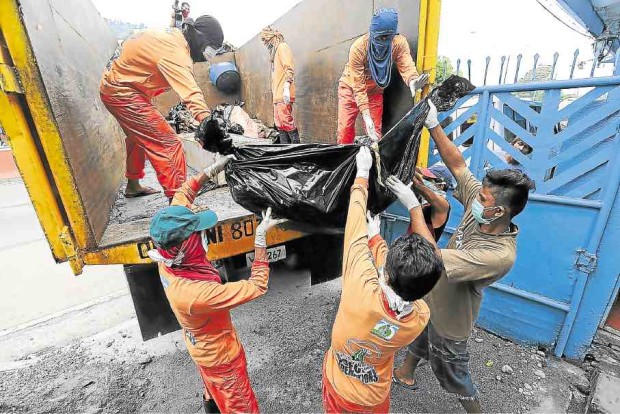
Workers load the decomposing bodies found at Henry Memorial Services funeral parlor on a dump truck for mass burial on Wednesday. —GRIG C. MONTEGRANDE
More bodies were found on Wednesday at a funeral home in Quezon City which authorities permanently shut down after residents complained of the foul stench coming from the establishment.
During a surprise inspection the other day, city health officials discovered around 120 rotting corpses stockpiled in body bags at Henry Memorial Services on A. Bonifacio Avenue in La Loma.
When a team sent by the health department returned to the funeral home yesterday to take the bodies and bring them to a cemetery for burial, they found more corpses in body bags in the other rooms. Like the ones earlier discovered, these were in varying stages of decomposition, enveloping the establishment in an overpowering stench.
The discoveries, however, did not end there. More corpses submerged in fluid were found in a well outside the funeral home.
In the end, the team loaded nearly 200 bodies into two dump trucks and brought them to Novaliches Public Cemetery, where they were buried in a rectangular pit nearly seven feet deep and measuring 230 meters by 250 meters. The bodies from the well were not included and would be retrieved today.
Biggest mass interment
Verdades Linga, city health department officer, said that Wednesday’s burial was the biggest mass interment sponsored by the city government so far.
At press time, Henry Memorial Services owner Oscar Parales and manager Severino Mancia have yet to come forward and explain how so many bodies ended up rotting in the establishment, which was not equipped with proper freezers or a sewage treatment system.
The identities of the deceased and the manner of their death also remained a mystery. There were no death certificates or medico-legal documents recovered from the funeral home. The bags had no tags or labels.
“Public health is a graver concern that the death certificates,” Linga said. “Which is more important, the death certificates or the lives of those still living in the neighborhood?”
According to Linga, the establishment violated Presidential Decree No. 856 or the sanitation code which requires corpses that are not embalmed to be buried within 48 hours.
Used in med schools?
Linga also noted that Henry Memorial Services did not have a special permit for a sewage treatment plant for the proper disposal of embalming fluids. “So the fluids would just go straight to the normal drain and can mix with the water used in the residential area,” she said.
She also observed that some of the bodies appear to have been dissected, raising suspicions that these were used in medical schools.
The funeral home operated without a business permit in violation of the local government code, said Garry Domingo, chief of the city’s business permits and licensing office. Mounting complaints from residents led to the issuance of a cease and desist order in September but this was ignored by the business owner, he added.
Records showed that Henry Memorial Services’s last business permit was approved in June 2015, when it was able to secure the other required licenses, like those for sanitation, fire safety and plumbing.
“For a city with over 70,000 business establishments, one or two can evade compliance,” Domingo told the Inquirer. “It is not an excuse, but it can happen.”
Despite yearly routine inspections, not all businesses in the city can be checked, he said. “Rest assured, the city will not stop addressing these concerns,” Domingo said as he warned other funeral parlors in the city.
Body claimant arrives
Civil registrar Ramon Matabang said there were reports that the bodies were entrusted to Henry Memorial Services by other funeral homes which failed to claim them due to mounting fees.
“We have reports that they collect the bodies and offer storage and services but charge exorbitant fees,” he told the Inquirer.
According to him, some representatives from other establishments came yesterday to collect the bodies they had entrusted to the funeral home.
One of them, Jonathan Arceo of Everlasting Funeral Services, arrived as some of the bodies were being taken to the dump trucks.
Arceo wanted to retrieve the body of a 66-year-old Japanese national who died on Oct. 4. He presented a death certificate and said his company had paid P2,000 for storage and embalming services.
City officials, however, refused to let him retrieve the body. “We don’t know how we will explain this to his relatives,” Arceo said.
The QCPD-La Loma station chief investigator, SPO2 Ramwil Relox, said that without death certificates it would be hard to determine whether the bodies died within Quezon City or were brought in from other funeral homes in Manila or other areas.
“We still have no idea where these bodies came from,” Relox told the Inquirer.